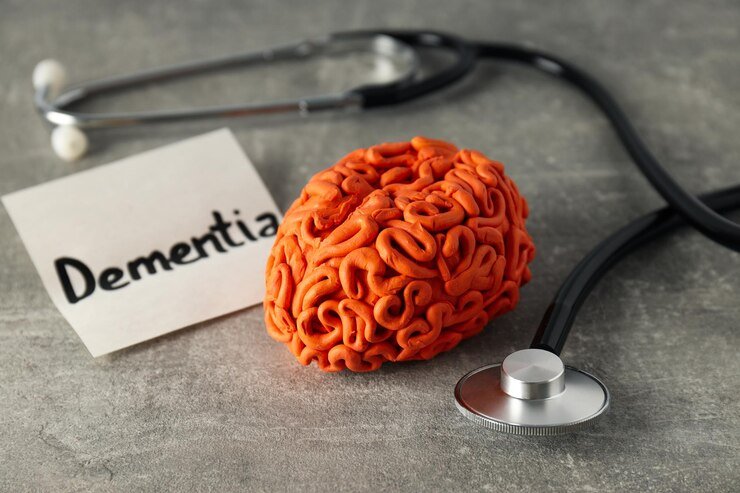Dementia, is a neurodegenerative condition that touches many families across the globe, transforming the lives of those it touches. It’s not just a disease of memory loss or confusion; it represents a profound shift in a person’s ability to engage in everyday life. In this blog post, we’ll delve deep into what causes dementia, explore both pharmacological and non-pharmacological treatments, and discuss how to support loved ones facing this challenging condition.
Table of Contents
What is Dementia?
Dementia is a general term used to describe various symptoms of cognitive decline, such as forgetfulness. It is a symptom of several underlying diseases and brain disorders. Alzheimer’s disease is the most common cause of dementia and is responsible for 60-80% of cases. It is not a single disease; it’s a broad term that covers a wide range of specific medical conditions, including Depressive disorder, especially Alzheimer’s disease.
Causes of Dementia:
Understanding the causes of dementia can be challenging because multiple factors influence its development and progression. It generally comes by harm or death to nerve cells and the connections that connect them in the brain. Dementia can affect people differently and generate varied symptoms depending on which part of the brain is damaged.
Genetic factors:
Certain types of dementia, such as early-onset Alzheimer’s disease, have a genetic component where mutations in specific genes are involved.
Age:
The risk of developing most types of dementia increases with age, the strongest risk factor for this condition.
Lifestyle and Heart Health:
Lifestyle factors that increase the risk of cardiovascular disease can also increase the risk of dementia. These include smoking, alcohol consumption, poor diet, lack of exercise, and obesity.
Other Factors:
Other contributing factors may include long-term alcohol abuse, hormonal imbalances, such as thyroid problems, and a history of head injuries.
Pharmacological Treatments:
There are medications available that can help manage some of the symptoms. However, there is currently no cure or a way to reverse its progression. The most commonly prescribed medications fall into two categories:
Cholinesterase inhibitors (e.g., Donepezil, Rivastigmine, and Galantamine):
These drugs work by boosting levels of a chemical messenger involved in memory and judgment. They are mainly used for Alzheimer’s disease but can be prescribed for other types of dementia.
Memantine:
Memantine works by regulating the activity of glutamate, another important brain chemical that may cause brain cell damage when produced in large quantities.
These medications may help reduce symptoms and help with certain behavioral problems. However, they’re not suitable for everyone, and they all come with the risk of side effects.
Non-Pharmacological Treatment:
Non-drug approaches can also help manage symptoms and improve quality of life. These include:
Cognitive stimulation:
Activities and exercises that stimulate thinking and memory might include puzzles, games, reading, or learning new skills.
Physical Activity:
Regular physical exercise can significantly benefit people in this state. It can improve mood, maintain a healthy weight, and maintain heart health.
Diet:
Eating a healthy, balanced diet is important for brain health. Diets such as the Mediterranean diet, which emphasizes fruits, vegetables, fish, and whole grains, and limits unhealthy fats and meats, have been associated with a reduced risk of this condition.
Social Interaction:
Maintaining regular contact with friends and family can prevent feelings of loneliness and isolation and may help preserve cognitive function.
Supporting a Loved one with Dementia:
Supporting someone in this state can be challenging but profoundly meaningful. It involves practical day-to-day support, emotional connection, and ensuring safety and comfort as the disease progresses. Here are a few tips:

Create a supportive environment:
This might involve safety-proofing the home to prevent falls and accidents and keeping a regular routine to help the person feel secure.
Communicate effectively:
Use simple words and sentences. Be patient in waiting for your loved one’s response and avoid criticizing or correcting them.
Engage in activities together:
Based on the person’s interests and abilities, plan activities you can do together. This can be as simple as a walk in the park, listening to music, or looking through old photos.
Frequently asked questions:
1. What are the first signs of dementia?
The initial signs can vary but commonly include short-term memory loss, such as forgetting recently learned information, appointments, or where everyday items are placed. Other early symptoms might include difficulties in finding the right words, changes in mood and behavior, confusion about time or place, and a decrease in the ability to perform planning or organizational tasks.
2. Can lifestyle changes reverse dementia?
While lifestyle changes alone cannot reverse this condition, they can significantly slow its progression and improve the quality of life for those affected. Adopting a healthy diet, maintaining regular physical activity, engaging in regular cognitive stimulation, avoiding smoking, and moderating alcohol intake are beneficial.
3. Are there any new medications for dementia on the Horizon?
Research into medications for dementia is ongoing, with several promising drugs in various stages of clinical trials. These include treatments aimed at targeting the underlying causes of Alzheimer’s disease, such as drugs designed to clear amyloid plaques from the brain or prevent their formation. Other innovative approaches include medications to address tau proteins, another hallmark of Alzheimer’s. Additionally, researchers are investigating the potential of drugs that might improve neuroplasticity and brain health.
4. What resources are available for caregivers of Dementia?
Caregivers of patients have access to a variety of resources to assist them. Many communities offer support groups where caregivers can share experiences and advice. Educational materials and workshops can help caregivers learn strategies for managing care and coping mechanisms. Additionally, professional help from home health aides, occupational therapists, and social workers can be invaluable.s

